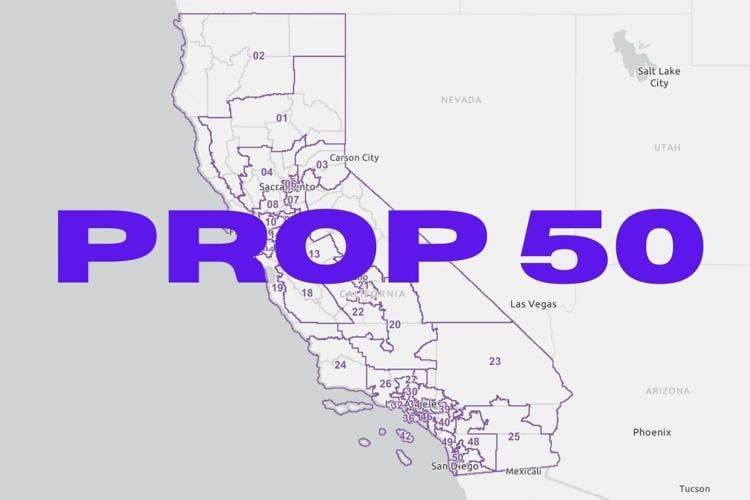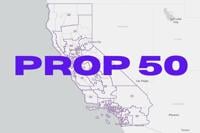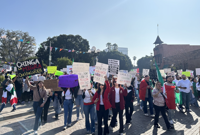
Many of the states Congressional districts were redrawn under Prop 50. (Screenshot from the California State Assembly Committee on Elections website)
This story is part two of a two-part series detailing how California’s Proposition 50 will impact Latinos.
As the Nov. 4 special election quickly approaches, state leaders are honing in on their messaging surrounding Proposition 50, a move that would redraw many of the state's Congressional districts, eliminate five Republican seats and push back against President Donald Trump’s attempt to control how the 2026 Midterm Election plays out.
Starting on Oct. 6, registered California voters will begin to receive ballots to vote on Prop 50. Led by Governor Gavin Newsom, the Yes on 50 campaign is being framed as a way to fight fire with fire - a move to even the playing field in Congress. But leaders are also adamant that the redistricting battle is bigger than just gaining some seats in Congress - it's about education, healthcare, immigration and the quality of life of Latinos.
"We have to fight fire with fire,” said Senator Alex Padilla during a press conference last week. “That's what Prop 50 is about because so much is at stake and so much is on the line.”
The redistricting battle started after Texas Governor Greg Abbott said his state would redraw its Congressional maps; the maps will add five new Republican seats and eliminate five Democratic seats, ensuring the party continues to control Congress going forward. By redrawing its own maps, California would essentially cancel out Abbott’s move.
“Instead of Governor Abbott and President Trump instructing the state legislature of Texas to do something, here the state legislature ultimately had to come together,” said Sonja Diaz, founder of Unseen, a non-profit organization focused on policy advocacy to elevate diverse populations.
What’s at stake?
If Republicans continue to control the House of Representatives and Senate, state leaders say, essential services will continue to be cut, severely affecting quality of life. They point to the cuts to the Department of Education, Medicaid and Medicare to show that Prop 50 is necessary in order to give these services a fighting chance.
For Latinos, cultural norms may make losses to access to education and increased cost of living hit harder.
“We talk about the disproportionate impacts on the community, the list is very, very long,” said Padilla, adding “(education) is so fundamental to the American dream. It's what my parents reminded me of every single day.”
Changes to financial aid under Trump's “One Big, Beautiful Bill” will result in students being able to take out less money to finance their education. Under the bill, graduate students will be unable to take out Grad PLUS loans and will have a cap on Parent PLUS loans starting in 2026.
The government shutdown that started on Oct. 1 is a result of a disagreement between Democrats and Republicans in Congress over subsidies dealing with the Affordable Care Act. Democrats wanted to extend tax credits that reduce the cost of health care, as well as reverse the cuts to Medicaid under Trump’s bill.
Republicans refused to negotiate and Democrats wouldn’t budge, so the government shut down.
“Latinos disproportionately could be impacted by the health care cuts that we are facing,” said Padilla, adding ”that's why we're in the shutdown standoff right now. We're trying to preserve accessible, affordable healthcare. The list goes on and on.”

Protestors take over the street in Los Angeles to protest anti-immigration raids on Sunday Feb 2, 2025. (Image credit: Brenda Verano)
The campaign
As 40% of California’s population, Latinos are not only set to be impacted immensely by any federal health care, economic and, obviously, immigration policies, but will also have a huge say in whether or not California’s Prop 50 passes.
But the voting bloc is not a sure fire thing; officials need to have targeted campaign messaging to ensure Latinos know exactly what they are voting for.
A poll conducted by the UC Berkeley Institute of Governmental Studies in August found that 51% of Latinos approved of Newsom’s performance, while 48% said they would vote yes on Prop 50 and 20% were still undecided.
Although just over half of Latinos in the state approve of Newsom, that doesn’t mean the voting bloc is a guarantee. Latinos aren’t a monolith, and often don’t vote the way the parties think they will, as was seen after the last presidential election when more California Latinos voted for the Republican candidate than was expected.
“Like most voters, Latinos care the most about the economy first. That is first and primary on their mind,” said Jarred Cuéllar, the California Faculty Association political action and legislative coordinator for the Cal Poly Pomona chapter and a political science professor specializing in Latino political behavior. He added, “how this impacts the economy and your livelihood is consistently missing from that message for Latinos.”
While the top issues for Latino voters are the economy, education and immigration, Democrats and Republicans alike tend to focus solely on the immigration issue. One thing that contributed to Latinos swinging to Trump in 2024, said Cuéllar, was that his campaign successfully focused on economic messaging, including ideas like no tax on tips or overtime.
One of the biggest struggles for the Yes on 50 campaign is how little time there is for officials to convince voters that passing the new maps is the best move for them. The time between when the campaign was announced and when voting ends (Nov. 4) is only 75 days.
“That is a limited amount of time to ensure that people understand that there's an election in an off-year, and that the election fully encompasses one thing, Proposition 50, and what that one thing is and is not, is gonna be really important,” said Diaz.
“I think there's what the campaigns can do, what the parties can do and then what communities that want to fight back against authoritarianism … can do,” said Diaz. She also said communities must understand that “what's at stake is their livelihood, their futures, the capacity of families to be together, their ability to be able to engage and thrive in an economy that works for them. And that message is different and distinguishable than something about saving our democracy.”
Cuéllar echoed Diaz’ thoughts about a necessary shift in campaign messaging.
“We have to make it to where it's tangible where people are like, ‘if you don't like what's going on with the immigration, if you don't like what's going on with inflation and the economy, this is why Prop 50 needs to pass,” said Cuéllar. He continued, “and that would resonate with Latinos a lot more than trying to throw these abstract concepts like ‘we have to fight the authoritarian or fascist regime.’”
As voting day quickly approaches, advocates in the Latino community believe approving Prop 50 is a way to come together and stand against the administration.
“When it comes down to the nitty gritty of it, if you want the economy to get better, if you want your health care (costs) to not go up, then it's essential that we, as a community of Latinos, rally around Prop 50,” said Cuéllar, adding “not just because the economy but also the immigration raids … if we don't like what's happening right now, if we're worried, this is the one way we can step up. This is the one way we need to step up.”












(0) comments
Welcome to the discussion.
Log In
Keep it Clean. Please avoid obscene, vulgar, lewd, racist or sexually-oriented language.
PLEASE TURN OFF YOUR CAPS LOCK.
Don't Threaten. Threats of harming another person will not be tolerated.
Be Truthful. Don't knowingly lie about anyone or anything.
Be Nice. No racism, sexism or any sort of -ism that is degrading to another person.
Be Proactive. Use the 'Report' link on each comment to let us know of abusive posts.
Share with Us. We'd love to hear eyewitness accounts, the history behind an article.